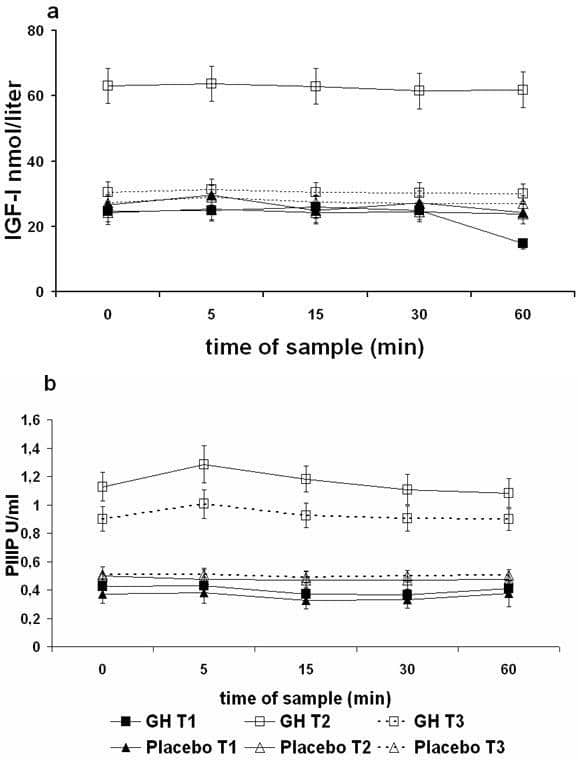Recombinant human growth hormone (rhGH) is used by some athletes in an attempt to enhance athletic performance. Insulin like growth factor I (IGF-I) and the N-terminal extension peptide procollagen type III (PIIIP) have been identified as potential markers of rhGH abuse (Dall et al. 2000; Wallace et al. 2000). The aim of the present study was was to determine the effects of a single bout of high resistance weight-liftinig exercise with or without rhGH loading, on these markers in weight trained athletes. Fifteen young male subjects (mean age 25.3±1.6 (SEM) years) were randomly assigned to either placebo or rhGH groups. Subjects were sportsmen already undertaking regular strength training exercise. However, in order to create a more homogenously trained group, the subjects underwent 4 weeks of a standardised and supervised general strength training program prior to entering the study. The subjects were tested on 3 days: T1 following the 4 week training period; T2 following 2 weeks of either rhGH 0.1 IU/kg/day or placebo administration; and T3 following a 1 week washout period. On the test days, subjects performed an acute high resistance exercise test (AHRET) which comprised 6 sets of 10 repetitions at 80% 1-repetition maximum with 2 min rest between sets. The AHRET took place at the same time in the morning for each subject, in the fasted state and following insertion of a cannula in a radial vein. Blood samples were taken at rest, and at 5, 15, 30 and 60 min post exercise. The samples were analysed for IGF-I and PIIIP using radioisotopic assays. Administration of rhGH resulted in significantly (p<0.01, ANOVA with repeated measures) increased levels of both IGF-I and PIIIP at all time points (GH T2 in Fig. 1a and 1b). After a 1 week washout period, IGF-I levels had returned to baseline, but in T3 PIIIP levels remained significantly elevated in the rhGH group(p<0.01). Exercise alone did not significantly affect levels of IGF-I or PIIIP, although there was a tendency for mean PIIIP values to be elevated in the rhGH treatment group at 5 min in T2 and T3. The data suggest that in strength trained individuals rhGH adminstration has a marked effect on serum IGF-I and PIIIP, but this is not appreciably effected by high resistance exercise. The results of the study would suggest that elevated levels of these markers are indicative of rhGH abuse independent of exercise in strength trained athletes.
University College London 2006 (2006) Proc Physiol Soc 3, C48
Oral Communications: The effects of two weeks recombinant growth hormone administration on the response of IGF-I and PIIIP to a single bout of high resistance exercise in resistance trained young men
C.Velloso1,7, M. Aperghis1, R. Godfrey5, A. Blazevich5, C. Bartlett4, D. Cowan4, R. Holt6, P. Bouloux3, S. Harridge2,7*, G. Goldspink1*
1. Department of Surgery, 2. Department of Physiology, 3. Centre for Neuroendocrinology, Royal Free & University College Medical School, London, United Kingdom 4. Drug Control Centre, King's College London, London, United Kingdom. 5. School of Sport and Education, Brunel University, Uxbridge, United Kingdom. 6. Department of Endocrinology & Metabolic Programming, University of Southampton, Southampton, United Kingdom. 7. Division of Applied Biomedical Research, King's CollegeLondon, London, United Kingdom.
View other abstracts by:
Figure 1. IGF-I and PIIIP levels in serum before (0 min) and after a bout of exercise.
Where applicable, experiments conform with Society ethical requirements.

